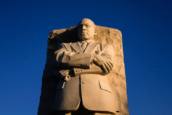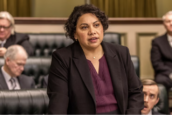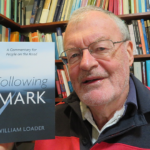
“I can’t breathe.” Three short words. Three words that shot around the world. “I can’t breathe.”
We all know who said that, and the circumstances that drew these words from his mouth. We all know that soon after he said this, George Floyd died. Another black man, dead, at the hands of a white police officer.
“Ah well, that was in America”, you might think. Yes, it was. And many other Afro-American people have died in similar circumstances, victims of what appears to be, quite simply racism. A shameful story. A shameful record. But in America. Not here. Not in Australia.
Except—not so fast! Because here, in Australia, we have recently been reminded, there are 434 people—black men and women, indigenous Australians—who have died whilst in police custody, since 1991. (That was the year when the Royal Commission into Aboriginal Deaths in Custody ended.)
And one of the more recent people to die in such circumstances in Australia also uttered those words: “I can’t breathe.” (David Dungay, in 2015. And he said this phrase twelve times, before he died.)
So we Australians are not exempt from the shame of this racist record. Our very own nation has not yet found a way to address the systemic bias, the systematic persecution, of indigenous Australians. They are only 3% of our population, but they are represented amongst the prison population in numbers out of proportion to their presence in society.
And from all of those 434 deaths, after multiple enquiries, there have been—how many convictions? The sum total remains at zero.
What does this have to do with our faith? How does this impact on us as we go about our lives as followers of Jesus?
Last week, Dr Deidre Palmer, the President of the National Assembly of the Uniting Church, wrote:
“In the Bible, our sacred text, we hear God’s cry for justice for those who are living in poverty, those who are oppressed by unjust systems, those who are excluded and discriminated against.”
She went on to say:
“The Jesus we know from the Gospel stories, calls leaders to use their power in service to others, to call forth in others compassion, justice and kindness, unity and community. These are the leaders, we are called to be and that we need in the world today.”
Pastor Mark Kickett, the Interim National Chairperson of the Uniting Aboriginal and Islander Christian Congress, joined his voice on this issue, saying:
“It boggles the mind as to how such inhumanity continues to exist in the modern world in which we live, yet it still does.” He quoted the Prophet Amos: “Amos speaks very clearly in relation to this matter where he says; ‘But let justice roll down like waters, and righteousness like an ever flowing stream’” (Amos 5:24).
Our faith includes a clear call, for us to work so that we avoid perpetuating such injustices in our society. Our President said, in her Pastoral Letter for National Reconciliation week:
“We need to strengthen our actions for justice, healing and reconciliation. This is not an abstract call – it is seen expressed daily in our relationships with one another in this country.
It is seen when we:
• call out racism;
• tell the truth about the history of colonisation, dispossession and the undermining of First People’s culture, language and spirituality;
• advocate for First People’s voice to be heard in determining their future;
• respect and appreciate the culture and stories of First Peoples, and work together to deepen our relationships based on reconciliation that arises from justice, and leads to healing; and.
• live in harmony with the sacred land that we share.”
That is the challenge that sounds forth from our church leaders. That is the challenge that sits at the heart of the Gospel. As we live our lives by faith, following the way of Jesus, might we know also the claim that these words have on us.
We are called to stand firm for justice, to stand firm against injustice. We have a charge to call out racism, to call for reconciliation.
If that means that no black person in custody will then have to utter those tragic words, “I can’t breathe”—it will be worth taking that stand, making that call.
John Squires is the Presbytery Minister (Wellbeing) for Canberra Region Presbytery. This piece originally appeared on his blog, An Informed Faith
- Categories: Features, First Peoples, Your Say




























































